In This Issue
The opinions, beliefs and viewpoints expressed in this publication are those of the authors. They do not necessarily reflect the opinions, beliefs, viewpoints or official policies of Autism Society Alberta. |
|
|
What Other People Say Sometimes
Carmen Moore
Typically, I am a very positive person. If you knew me in real life, I tend to have a bit of a smile as my ‘resting face’. I have been blessed with this disposition, as it has really helped me to face some difficult times in my own life. Sometimes, I try to tell myself to tone down my enthusiasm, to ‘fit in’. But I soon forget that effort, and cannot contain my own excitement. That is not to say I don’t have down days or times. I have experienced grief throughout life, as has everyone in this human experience, at least at some point. But in general, life is good.
There is one thing that can get to me, and I almost hesitate to even bring this up, as I do not want to seem like a downer, especially before Christmas. But this is a season when we tend to visit family, friends, church, community events, school concerts, parades, and the like. There are many people during these occasions that we only see intermittently. It is during some of these events/visits that some off-putting comments can be made. I know that I have heard such comments about my own family, but also my friends with kids on the spectrum have heard similar comments. Collectively, either personally or relayed to me, there have been some negative comments such as “Well, just be sure to remember he is still a gift, no matter what”, or “Will you try for another, or are you hesitant now?”, or “If you left them with me for a weekend, they wouldn’t be [fill in the blank here] anymore…” and other similar comments. are many people during these occasions that we only see intermittently. It is during some of these events/visits that some off-putting comments can be made. I know that I have heard such comments about my own family, but also my friends with kids on the spectrum have heard similar comments. Collectively, either personally or relayed to me, there have been some negative comments such as “Well, just be sure to remember he is still a gift, no matter what”, or “Will you try for another, or are you hesitant now?”, or “If you left them with me for a weekend, they wouldn’t be [fill in the blank here] anymore…” and other similar comments.
These words are sometimes spoken out of true concern, feeling unsure of what to say, I guess, or just frustration and misunderstanding. I don’t always know, or have the mental energy to care to know, at this point. I think my own kid is the absolute bee’s knees, and I couldn’t be luckier to watch him grow to be the person he is and becomes every day. No offhand comments will ever change how I feel about him.
On the other hand, I am also reminded of the balance; of incredibly kind, loving, and supportive comments and acts of selfless giving that our family also receives in regard to my son. He has loved car washes for  years, and so many of my family/friends will take him out for a much-needed break from a long social evening, for a ‘supreme wash’ at the car wash of his choice. This means so much to him, but also to me. We were recently at a wedding out of town, and the father of the bride picked him up early in the morning for a quick car wash and breakfast out together, to start his day off right. Cousins of mine have picked him up for motorcycle rides, got him up in group dancing, and laughed with him around the campfire. They send funny videos or pictures they know he will enjoy, or chat with him on FaceTime while he asks non-stop questions. Each staff member at his school will light up when talking about him, which I really appreciate too. years, and so many of my family/friends will take him out for a much-needed break from a long social evening, for a ‘supreme wash’ at the car wash of his choice. This means so much to him, but also to me. We were recently at a wedding out of town, and the father of the bride picked him up early in the morning for a quick car wash and breakfast out together, to start his day off right. Cousins of mine have picked him up for motorcycle rides, got him up in group dancing, and laughed with him around the campfire. They send funny videos or pictures they know he will enjoy, or chat with him on FaceTime while he asks non-stop questions. Each staff member at his school will light up when talking about him, which I really appreciate too.
The good certainly outweighs the other situations. Life will not always be smooth sailing, as they say, but it is important to try to catalogue any good that comes our way as a family. As you head into these holiday events, look for any kind gesture to keep in your heart, and provide some for others if possible too.
|
|
|
Autism Society of the RMWB

Our adult life skills program is focused on teaching and helping neurodiverse young adults from ages 18-29 to learn a variety of different life skills such as health and self-care, personal finance, household management, relationships, etc. This program runs every Wednesday from 6pm to 8pm.
Participants are able to register for the program through this link.
For more information please contact Leslie Rae Samson, LifeSkills Leader
Email: lifeskills@autismrmwb.org
Phone: 587-452-9334
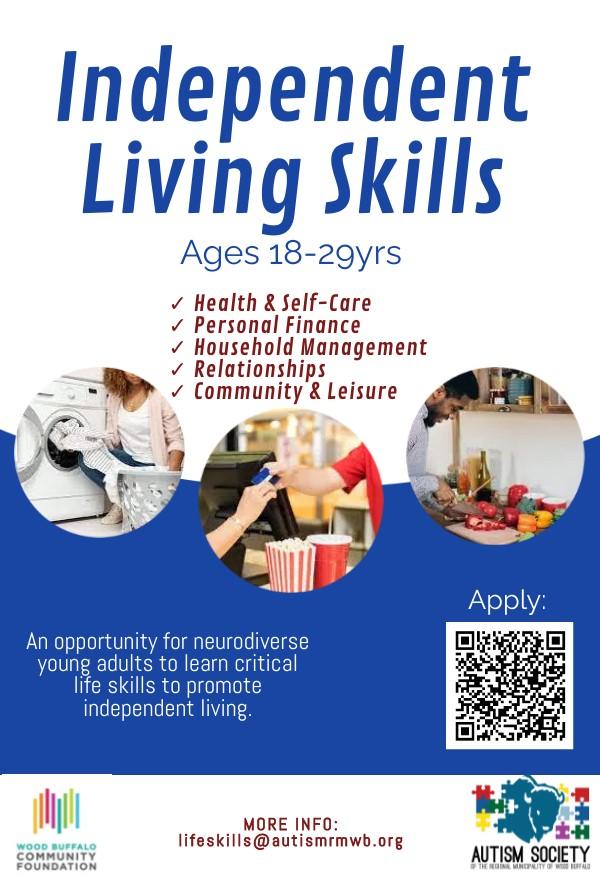
|
|
|
Monthly RDSP & DTC Tips
Stephen Sicoli
Disability Tax Credit for the Deceased
Nothing is certain but death and taxes. When a loved one passes away, families often discover new tax challenges; but some tax resources are available for relief – particularly if the loved one lived with a disability. For instance, surviving family members may claim the Disability Tax Credit for a deceased loved one. There are often taxes to be paid upon passing. Claiming the DTC after someone passes away can reduce the tax burden on the estate, thus leaving more money for the family and legal heirs. With the Disability Tax Credit, you can go back up to 10 years for any years that they are eligible. This means, upon a loved one's passing, you could reduce their taxable income by up to $80,000. This credit will need to be applied for by an executor or legal representative; it is highly recommended, as this can result in lower taxes upon passing, or even a rebate on taxes paid in previous years. You can also transfer the credit if the deceased was not working or had a low income, so the benefit would be better utilized. A "supporting person" would transfer the credit to themselves. This can be done within the first 10 years of their passing. often taxes to be paid upon passing. Claiming the DTC after someone passes away can reduce the tax burden on the estate, thus leaving more money for the family and legal heirs. With the Disability Tax Credit, you can go back up to 10 years for any years that they are eligible. This means, upon a loved one's passing, you could reduce their taxable income by up to $80,000. This credit will need to be applied for by an executor or legal representative; it is highly recommended, as this can result in lower taxes upon passing, or even a rebate on taxes paid in previous years. You can also transfer the credit if the deceased was not working or had a low income, so the benefit would be better utilized. A "supporting person" would transfer the credit to themselves. This can be done within the first 10 years of their passing.
Click here to follow our Eventbrite Page to see all our upcoming presentations. You can also contact Stephen through email at stephens@autismalberta.ca for more information.
|
|
|
Children's Link
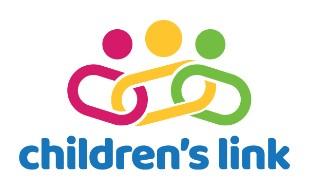
The Children’s Link Society is excited to invite you to our 2023 ACCESS for ALL Live Kickoff Events, formerly known as our Community Resource Fairs!
There will be many organizations and service providers at virtual booths manned with real people, who are prepared to give you information and answer your questions! Admission is free for families (please ensure you choose “Family Registration” as your ticket selection), but you do need to pre-register so we can send you information about the online platform, what to expect, and the link to attend. To register for ACCESS for ALL, go here.

|
|
|
What Is a Structured Environment?
Why Is It Helpful for
Autistic Individuals?
Maureen Bennie

From the Autism Awareness Centre Inc. Blog:
A structured environment describes the conditions under which a person should be taught and supported, rather than where they should be taught or what to learn. This is a system for organizing environments, developing appropriate activities, and helping people understand what is expected of them.
A structured environment is comprised of the physical setup of a room/space, schedules, work systems, routines and visual strategies, and the visual structure of materials. All of this can help a person sort out what information is relevant vs. nonrelevant, provide predictability, give visual cues as to what comes next or what to do, support transitions, and reduce stress and anxiety. Having a structured environment at home, school, or in the workplace increases the likelihood of success.
Autistic people benefit highly from regulated and predictable schedules, and may need help to overcome anxiety around any transitions and change by finding and highlighting areas of predictability within them. While communication can be an issue for autistic people, creating predictability and lowering anxiety can go a long way toward creating an environment that supports the most communication possible.
Let’s explore some of the aspects of a structured environment.
The Physical Space
In my blog post Supporting Autistic Students in the Classroom, I wrote about how to structure a classroom space and what to consider. How do we do this in the home environment?
- Provide a quiet space to retreat to.There are places to go in our home where one can sit quietly and be undisturbed. Our son uses his bedroom for this purpose daily. He retreats to read aloud to himself or to meditate to music. Our
 daughter wears noise-cancelling headphones when she needs complete silence in her space. There are always opportunities to withdraw and regroup throughout the day. daughter wears noise-cancelling headphones when she needs complete silence in her space. There are always opportunities to withdraw and regroup throughout the day.
- Have an organized home. Easier said than done at times, but knowing where things are, or where they go after you’ve used them, creates order and predictability. This also fosters independence, because if you know where the item lives, it’s easy to find and/or put back.
- Know which activities happen in what space. Have a dedicated area to do homework. Use tech devices in certain areas of the house, and try to refrain from using them in a bedroom, where they can interrupt sleep and supervision is more difficult to provide.
- Establish routines in spaces throughout the day. Consistency is key for routines, and establishing them supports predictability and independence. Since our children have been young, they’ve had established routines around mealtimes, bedtime, hygiene, getting dressed, and weekday/weekend schedules. Weekends are more relaxed, but their daily living routines are still intact. They also know where all of these routines take place in our home.
- Have the visual schedule visible for easy referral. Now that my children are adults, we also use day-timers on their desks, and wall calendars that hang in their bedrooms.
Visual Supports and Schedules
Visual supports can take many forms. You may have to try several different types to figure out which ones a person prefers and understands best. Some examples of visual supports are:
- tactile symbols/objects of reference – Ex. a book means story time; a ball means time for outdoor play, etc.
- photographs – so easy to produce in the digital age
- short videos
- miniatures of real objects
- colored pictures
- line drawings
- symbols
- written words – I always recommend putting text with picture visuals. My autistic daughter could read at the age of 4 before she could speak.
Use visual supports for:
- making choices – start by teaching this concept with a preferred and non-preferred activity so the child starts to understand they are making a choice
- first/then – Ex. First we clean up/ Then we go outside. First/then can also be motivational.
- single messages – going to the toilet, playing outside, snack time
- timetable, schedules, and sequences of activities, such as a play sequence to support play skills. Ex. Restaurant play sequence – take the order, cook the food, serve the food, clear the table, and pay the bill.
- task breakdown – the individual steps for a task such as washing hands, and dressing for going outdoors. This supports recognizing relationships between steps of an activity.
- to show units of time – 1 minute, 2 minutes, 5 minutes. You can use these units of time for countdowns to transitions, such as moving from one activity to another, or having to stop an enjoyable activity.
Visual Schedules
Visual schedules can be daily, weekly or monthly, or any combination of these. We 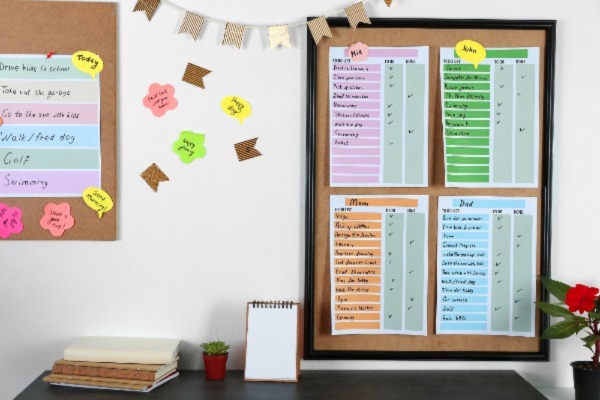 can also teach flexibility through visual schedules by adding in a new activity or task from time to time. I used to add the word “surprise” to my children’s schedules, to teach them that unexpected things happen, even when the day is structured and planned; and that it isn’t always a bad thing. As adults, they both have a good degree of flexibility, which has served them well in their volunteer positions and community activities, and with ongoing staff absenteeism. can also teach flexibility through visual schedules by adding in a new activity or task from time to time. I used to add the word “surprise” to my children’s schedules, to teach them that unexpected things happen, even when the day is structured and planned; and that it isn’t always a bad thing. As adults, they both have a good degree of flexibility, which has served them well in their volunteer positions and community activities, and with ongoing staff absenteeism.
The concept of making a choice can also be introduced through a visual schedule. There can be a part of the day allotted for choosing an activity. When first introducing choices, limit them to 2 options. To teach this concept, you can make one of the choices a non-preferred one, so that the idea of choosing something you like is understood.
Visual supports and schedules support greater independence as well. As the late Barbara Bloomfield, SLP, said, “True independence implies being able to set up visual supports of your own as you need them. Making lists, keeping track of appointments, and visually organizing one’s living spaces and possessions are all self-prompting strategies that can be taught in small steps beginning at the preschool level.”
Structured Work Systems
Structured work systems were first created by Division TEACCH. A structured work system is a setup of work to be done within a visually cued system that answers four questions:
- What work needs to be done?
- How much work needs to be done?
- How do I know when I’m finished?
- What do I do next?
Work systems can be used in a variety of settings such as the home, school, or workplace, and with all ages from preschool through adulthood. The level of difficulty can be increased by increasing the amount of work, the number of tasks, or bumping it up by having the person move to check their schedule and/or travel to get their tasks.
You can start this process by using baskets or bins that are set up with a schedule about what to do first and next, and then have a visual at the end indicating what to do when a person is finished. Resources that support work systems are the Tasks Galore books, and Building Independence: How to Create and Use Structured Work Systems. Even part of being social is knowing how to finish something.
Visual Structure of Materials
The visual structure of materials refers to what they look like and how they will be used. Some examples are:
- Having a worksheet with a limited number of questions and a dedicated space drawn, such as a square, on where to write the answer.
- Showing the sequence of steps inside a container along with the objects, then moving along left to right with each numbered step.

- Tape the actual item outside of the bin where the items go. Ex. Taping a pop can outside of a bin to show that the cans go inside the bin.
- A written list with pictures showing each step.
- A picture of what the finished product will look like, along with the materials to make it, in a basket.
There are many ideas and ways to use materials to support comprehension. You may find the Structured Tasks videos and suggestions from the Indiana Resource Center for Autism helpful.
Although it takes some effort to set up a structured environment, over time you’ll see greater independence and reduced anxiety from the individuals you are supporting. This environment can be helpful with other disabilities, or people learning a new language. Having clear expectations and systems that are understood will help with the flow of the day, and foster success no matter what the setting is.

|
|
|
Sinneave Family Foundation

Do you have goals in employment, post-secondary education,
or independent living?
We want to help you create a plan to achieve them!
The Launch into Life! QuickStart Planning Tool is a resource designed to assist autistic individuals in creating a personalized plan for success as they transition to adulthood. If you know someone who is looking ahead to graduation, now is the perfect time to consider what might be next. You are invited to join this free, virtual workshop series where we will walk through the Launch into Life! QuickStart Planning Tool in a small group format.
Together, we’ll:
- break the information down into manageable steps,
- facilitate connection and rich discussions with peers in similar life phases, and
- help you take the first steps toward reaching your goals!
This 2-part virtual workshop series is open to autistic Albertans ages 15+ and those in their support network. The sessions are designed to build on each other, therefore we ask participants to commit to attending both sessions. We also ask that participants take a look at the tool beforehand. You can access the document on our website HERE, or in our *NEW* Sinneave Connects learning portal. Registration and the workshop itself will all take place on Sinneave Connects.
To access the registration portal, click on the words SINNEAVE CONNECTS. If you are a return user, simply log in with the user name and password you previously created. When it’s time to attend, you simply log into the portal and click on the event to access the workshop. Of course, if you have any difficulty accessing the portal, we’re here for that too! You can email info@sinneavefoundation.org or call 403-210-5000 (during business hours) for technical support.
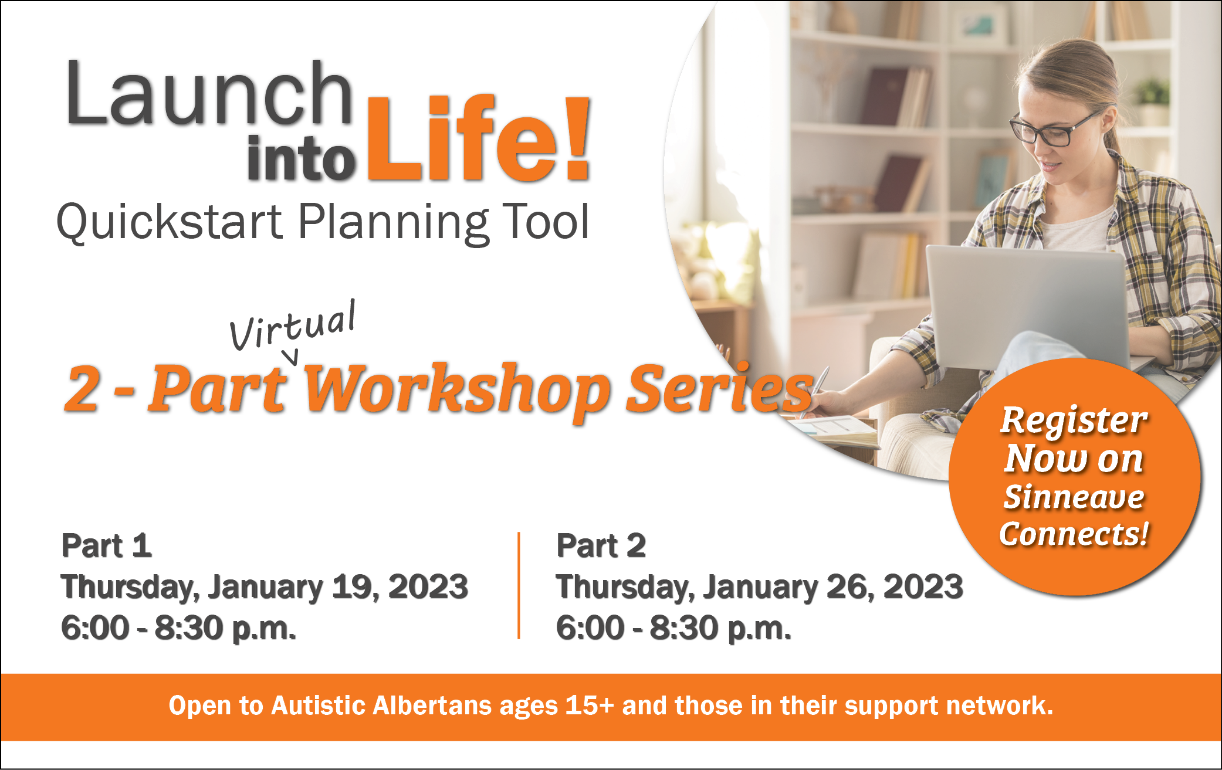
|
|
|
Children's Autism Services
of Edmonton
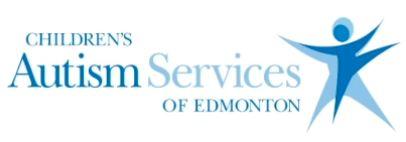
Children’s Autism Services of Edmonton’s 15th Annual Autism Conference is coming up fast! The fantastic speaker line-up includes Ross Greene, Stuart Shanker, Peter Szatmari, Ros Blackburn, Shelley Moore, Tom D’Eri, Kelly Mahler, Carole Anne Hapchyn, Lindee Morgan, and more! Reserve your seat now. Both in-person and virtual registration options are available.
Join in person to experience Friday’s speaker-inspired Appetizers for Autism. In-person attendees also have the opportunity to add on a VIP “Meat and Greet” with Ross Greene.
For more information and to register, please visit www.caseconf.ca
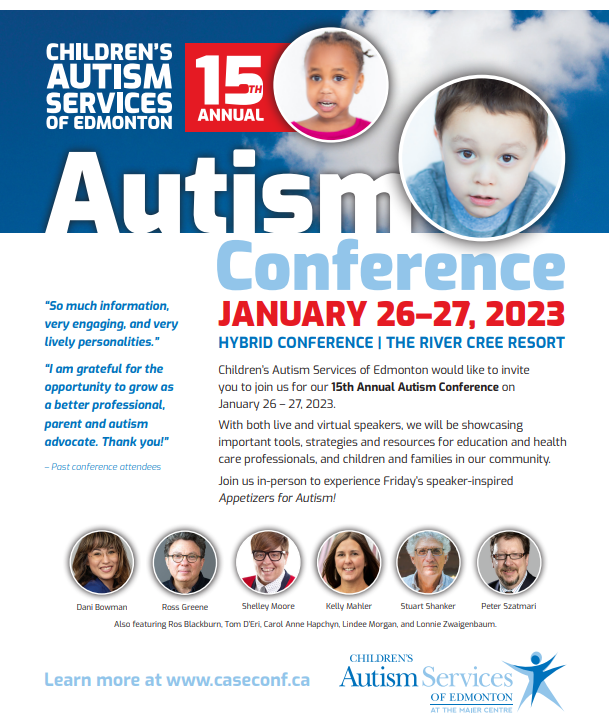
|
|
|
Centre for Autism Services Alberta
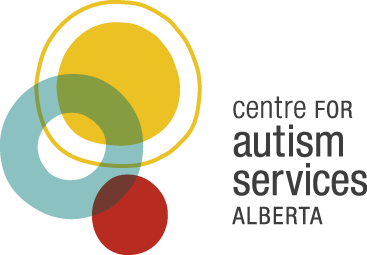
Happy Holidays from the Centre for Autism Services Alberta!
Winter 2023 programs are HERE! Registration is open to the public for our community programs. Art programs, athletic programs for children, teens, and young adults, social nights for teens and adults, Shop Cook & Learn for teens – the list goes on! We’ve got something for everyone, so check our website and find the perfect program today.
Thinking about getting a job? EmploymentWorks offers employment readiness training, job sampling, and work experience opportunities for individuals with a disability, including but not limited to autism. Participants must be motivated to seek employment. There are two phases to the program – a 60-hour phase of classes which includes the opportunity to try different jobs, and a second phase made up of active engagement in the labour force supported by employment coaches and our job club. Enrollment is ongoing and the program is available to ages 15-64. To inquire and to register, send us an email at EmploymentWorks. Start your job search today!
PEERS for Teens and PEERS for Young Adults are recruiting participants on an ongoing basis for upcoming sessions.
Program for the Education and Enrichment of Relational Skills (PEERS) is a world-renowned, evidence-based social skills program for teens and young adults with autism, aged 13 to 17, and ages 18-29. Participants and their parents, social coaches, or guardians meet weekly for 14 weeks (16 weeks for young adults). The skills taught in the PEERS program can help pave the way for creating healthy friendships and relationships, as well as securing meaningful employment. And now with options for in-person (Edmonton) and digital delivery methods, this sought-after program is available Alberta-wide. Click here to learn more about PEERS for Teens. Click here to learn more about PEERS for Young Adults. To apply for PEERS, email us at teenandadult@centreforautismab.ca
Now accepting applications for Facing Your Fears for 2023. This program is for ages 8-14 and is designed for children on the autism spectrum who are having difficulties managing their anxiety. A well-developed caregiver education component is part of the program, allowing strategies learned in groups to be implemented at home. Not in Edmonton? No problem! Facing Your Fears runs virtual AND in-person cohorts. This 13-week program consists of 90-minute sessions, once per week. It focuses on helping children and their caregivers identify worries, develop coping strategies, and practice managing anxiety with guidance from program facilitators. Caregiver participation is required. It is delivered by a registered psychologist and an occupational therapist. Funding may be provided by FSCD.
For more information and to apply, please contact Anne Beattie at 780-488-6600 ext. 314, or email Anne at abeattie@centreforautismab.ca
Start 2023 with START at the Centre! The START Program is a sought-after group program for parents/caregivers of young children with autism. Based on Pivotal Response Treatment (PRT), a therapy model developed by the Koegel Autism Centre in California, this innovative program teaches parents practical strategies to support their child in using words and sentences to ask for things, answer questions, make choices, and copy what other people say. Winter session starts January 5, 2023! Visit our website for more information and to register today!
|
|
|
Holiday Laughs

|
|
|
Merry Christmas

|
|
|
|
|